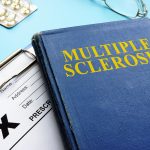
Patients in the earliest stages of multiple sclerosis might develop certain symptoms that offer an early clue to the degenerative nerve disease, researchers report. Depression, constipation, urinary tract infections and sexual problems are all more likely in MS patients five years before their official diagnosis, compared with people who never develop MS, researchers found. Those conditions are also more likely to occur in people with other autoimmune diseases like lupus or Crohn’s disease, results show. These early signs “would not necessarily lead to earlier diagnosis of the disease in the general population, since these conditions are common and could also be signs of other diseases, but this information could be helpful for people who are at a higher risk of developing MS, such as people with a family history of the disease or those who show signs of MS on brain scans but do not have any symptoms of the disease,” said researcher Dr. Celine Louapre, an associate professor of neurology at Sorbonne University in Paris. MS occurs when the immune system attacks the protective sheath that covers nerve fibers, causing progressive interruption of nerve signals between the brain and the body. For the study, Louapre and her colleagues compared more than 20,000 people newly diagnosed with MS with nearly 55,000 people who do not have MS. Each MS patient was matched with three healthy people… read on > read on >


















